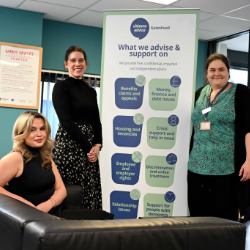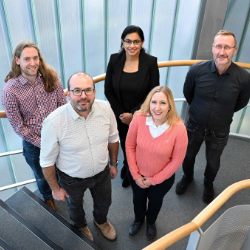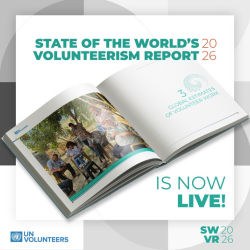-
Study
-
Quick Links
- Open Days & Events
- Real-World Learning
- Unlock Your Potential
- Tuition Fees, Funding & Scholarships
- Real World Learning
-
Undergraduate
- Application Guides
- UCAS Exhibitions
- Extended Degrees
- School & College Outreach
- Information for Parents
-
Postgraduate
- Application Guide
- Postgraduate Research Degrees
- Flexible Learning
- Change Direction
- Register your Interest
-
Student Life
- Students' Union
- The Hub - Student Blog
- Accommodation
- Northumbria Sport
- Support for Students
-
Learning Experience
- Real-World Learning
- Research-enriched learning
- Graduate Futures
- The Business Clinic
- Study Abroad
-
-
International
International
Northumbria’s global footprint touches every continent across the world, through our global partnerships across 17 institutions in 10 countries, to our 277,000 strong alumni community and 150 recruitment partners – we prepare our students for the challenges of tomorrow. Discover more about how to join Northumbria’s global family or our partnerships.
View our Global Footprint-
Quick Links
- Course Search
- Undergraduate Study
- Postgraduate Study
- Information for Parents
- London Campus
- Northumbria Pathway
- Cost of Living
- Sign up for Information
-
International Students
- Information for International Students
- Northumbria and your Country
- International Events
- Application Guide
- Entry Requirements and Education Country Agents
- Global Offices
- English Requirements
- English Language Centre
- International student support
- Cost of Living
-
International Fees and Funding
- International Undergraduate Fees
- International Undergraduate Funding
- International Masters Fees
- International Masters Funding
- International Postgraduate Research Fees
- International Postgraduate Research Funding
- Useful Financial Information
-
International Partners
- Agent and Representatives Network
- Global Partnerships
- Global Community
-
International Mobility
- Study Abroad
- Information for Incoming Exchange Students
-
-
Business
Business
The world is changing faster than ever before. The future is there to be won by organisations who find ways to turn today's possibilities into tomorrows competitive edge. In a connected world, collaboration can be the key to success.
More on our Business Services-
Business Quick Links
- Contact Us
- Business Events
- Research and Consultancy
- Education and Training
- Workforce Development Courses
- Join our mailing list
-
Education and Training
- Higher and Degree Apprenticeships
- Continuing Professional Development
- Apprenticeship Fees & Funding
- Apprenticeship FAQs
- How to Develop an Apprentice
- Apprenticeship Vacancies
- Enquire Now
-
Research and Consultancy
- Space
- Energy
- AI and Tech
- CHASE: Centre for Health and Social Equity
- NESST
-
-
Research
Research
Northumbria is a research-rich, business-focused, professional university with a global reputation for academic quality. We conduct ground-breaking research that is responsive to the science & technology, health & well being, economic and social and arts & cultural needs for the communities
Discover more about our Research-
Quick Links
- Research Peaks of Excellence
- Academic Departments
- Research Staff
- Postgraduate Research Studentships
- Research Events
-
Research at Northumbria
- Interdisciplinary Research Themes
- Research Impact
- REF
- Partners and Collaborators
-
Support for Researchers
- Research and Innovation Services Staff
- Researcher Development and Training
- Ethics, Integrity, and Trusted Research
- University Library
- Vice Chancellors Fellows
-
Research Degrees
- Postgraduate Research Overview
- Doctoral Training Partnerships and Centres
- Academic Departments
-
Research Culture
- Research Culture
- Research Culture Action Plan
- Concordats and Commitments
-
-
About Us
-
About Northumbria
- Our Strategy
- Our Staff
- Our Schools
- Place and Partnerships
- Leadership & Governance
- University Services
- Northumbria History
- Contact us
- Online Shop
-
-
Alumni
Alumni
Northumbria University is renowned for the calibre of its business-ready graduates. Our alumni network has over 253,000 graduates based in 178 countries worldwide in a range of sectors, our alumni are making a real impact on the world.
Our Alumni - Work For Us
What will I learn on this module?
This first year module will introduce you to the topic of community and social work. You will learn about what we (and others) mean when we talk about ‘community’. During the module you will learn about key concepts such as participation, empowerment, and citizenship. You will explore the way professionals, volunteers and others work in and with communities to inspire social change. You will learn about the methods and community approaches they employ. The module will introduce you to the role of voluntary and community sector organisations and you will learn about concepts such as civil society and the third sector. You will learn about the policy context for these organisations and the contemporary issues these presently face.
You will also have the opportunity to learn from Educators by Experience about their experiences working in and with third sector organisations. Educators by Experience will share their experiences of how they have been involved in shaping services and organisations and how voluntary and community organisations support individuals and communities.
As a social work student this module will develop your knowledge about the range of organisations social workers work with and in. It will also provide you with skills to work in partnership with individuals, communities and third sector organisations using a range of community development approaches.
How will I learn on this module?
You will learn in a variety of ways in this module. You will learn through a programme of lectures delivered to a large group of students and seminars with small and large group discussions. Attendance at lectures and seminars will help you meet the learning outcomes for the module. Lectures will provide you with a range of perspectives relating to the topics outlined above and including community, community development, the third sector, volunteering, citizenship, participation, empowerment. Taught sessions will give you the opportunity to discuss ideas with peers and tutor in a supportive environment. A range of electronic resources will be available via the Blackboard Ultra e-Learning (eLP) site, including lecture materials, tutor's audio and video explanations as well as the use of discussions boards and links to external websites.
You will participate in skills development workshops which will develop your knowledge and skills of participatory research methods and skills. When possible external agencies, practitioners and people who use social work care and support services will be invited into taught sessions to provide further opportunity to link theory to practice.
There are opportunities for formative learning and assessment throughout the module to support your learning and to help you work towards the summative assessment. As part of the learning approach students will be involved in peer and self-assessment which will develop your critical evaluation skills and capacity for autonomous learning. Your self-directed reading and engagement with the module materials also form an important part of your learning.
How will I be supported academically on this module?
Tutors will support your learning in a variety of ways. They will provide a programme of lectures which relate to the learning outcomes for the module. Lectures will introduce you to key issues, concepts, perspectives and theories in relation to community and social work. Seminars and workshops will provide a supportive environment in which you can discuss and share your ideas as well as develop your formative and summative assessments. The module lead will also endeavour to invite external guests from a range of relevant organisations to develop your understanding of practice and theory. The module lead will provide reading materials, examples and activities for seminars to support the development of your understanding about community and social work. You will be provided with an electronic reading list which will include essential and recommended reading for the module and its assessment. You will also be supported to explore and engage in your own search for literature to support your curiosity and enquiry into particular organisations and service user groups.
What will I be expected to read on this module?
All modules at Northumbria include a range of reading materials that students are expected to engage with. Online reading lists (provided after enrolment) give you access to your reading material for your modules. The Library works in partnership with your module tutors to ensure you have access to the material that you need.
What will I be expected to achieve?
At the end of the module you will be able to:
Knowledge & Understanding:
1.Identify, define, and justify approaches, models and theories relating to the concept of community and community work.
2.Evaluate the strengths and weaknesses of voluntary and community organisations.
3.Gather and present robust evidence relating to communities and organisations.
Intellectual / Professional skills & abilities:
4.Demonstrate effective communication and presentation skills.
Personal Values
Attributes (Global / Cultural awareness, Ethics, Curiosity) (PVA):
5.Demonstrate curiosity and critical reflection in relation to communities and community development theory and practice within the context of social work.
How will I be assessed?
Formative assessment
You will be expected to make a presentation critically reflecting on module topics. Presentation feedback will be given during seminars to help you develop your learning and prepare for your summative assessment. Verbal feedback will be provided by your module tutor and peers during the seminar sessions.
(MLO 1,2,3,4,5)
Summative assessment
You will be expected to submit a written report of 2,000 words related to module topics. Guidance will be given during the module and in the module handbook regarding the structure of the report. The assignment submission is electronic via Turnitin. The assignment constitutes 100% of the marks for this module. You will be provided with electronic written feedback on your assessment through Turnitin.
(MLO 1,2,3,4,5)
Pre-requisite(s)
N/A
Co-requisite(s)
SW4000, SW4001, SW04003, SW04004, SW4005
Module abstract
This module introduces you to community and social work. It explores the way professionals, volunteers and others work in and with communities to inspire social change locally, nationally and globally. You will learn about the methods and community approaches they employ. This module provides an insight into alternative and complementary contexts for social work practice. Social workers do not just work in local authorities they also work in charities, voluntary-based organisations, community organisations and social enterprises. Likewise, professionals in these types of organisations often undertake work which can be compared with social work. Through teaching and learning on campus this module will help you to understand the main characteristics of these organisations and their roles in society and social work. It will also help you understand the complexity of working with and in communities, introduce you to the theories, models and approaches relating to working with communities and develop the skills required for social work practice.
Course info
UCAS Code L503
Credits 20
Level of Study Undergraduate
Mode of Study 3 years Full Time
School Communities and Education
Location Coach Lane Campus, Northumbria University
City Newcastle
Start September 2026
All information is accurate at the time of sharing.
Full time Courses are primarily delivered via on-campus face to face learning but could include elements of online learning. Most courses run as planned and as promoted on our website and via our marketing materials, but if there are any substantial changes (as determined by the Competition and Markets Authority) to a course or there is the potential that course may be withdrawn, we will notify all affected applicants as soon as possible with advice and guidance regarding their options. It is also important to be aware that optional modules listed on course pages may be subject to change depending on uptake numbers each year.
Contact time is subject to increase or decrease in line with possible restrictions imposed by the government or the University in the interest of maintaining the health and safety and wellbeing of students, staff, and visitors if this is deemed necessary in future.
Useful Links
Find out about our distinctive approach at
www.northumbria.ac.uk/exp
Admissions Terms and Conditions
northumbria.ac.uk/terms
Fees and Funding
northumbria.ac.uk/fees
Admissions Policy
northumbria.ac.uk/adpolicy
Admissions Complaints Policy
northumbria.ac.uk/complaints










